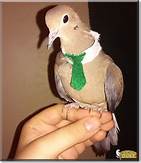Can You Have Pet Foxes?
Exotic pets are gaining popularity, and foxes are emerging as a potential choice due to their playful and curious nature. However, there are crucial considerations to weigh before deciding if a fox is a suitable pet for you.

Species and Legalities
1. Species of Foxes: There are different species of foxes with varying sizes and temperaments. The most commonly kept pet foxes include the Fennec fox and Arctic fox due to their smaller size and friendly nature.
2. Legal Considerations: Laws and regulations governing the ownership of foxes vary across countries and regions. Thorough research is necessary to determine the legality of owning a fox in your area and obtain any required permits and licenses.
Temperament and Behavior
1. Socialization: Foxes are social animals and do best when they have a partner or group to interact with. They may experience loneliness and behavioral issues if kept in isolation.
2. Predatory Instincts: Foxes are primarily predators and retain their hunting instincts even in captivity. They may exhibit behaviors such as chasing and pouncing on small animals and birds.
3. Training and Enrichment: Foxes are intelligent and capable of learning tricks and commands. Providing them with interactive toys and regular enrichment activities can help satisfy their natural curiosity and prevent boredom.
Environment and Care
1. Enclosure: Foxes need ample space to move around, climb, and dig. A spacious enclosure with multiple levels, hiding spots, and a digging area is ideal.
2. Diet: Foxes are omnivores and require a balanced diet consisting of raw meat, organs, bones, fruits, and vegetables. Supplements such as calcium and vitamin D are essential.
3. Veterinary Care: Foxes have unique health needs and should receive regular checkups and vaccinations. It's crucial to find a veterinarian experienced in caring for exotic pets.
Potential Challenges
1. Smell: Foxes have a distinctive scent that can be unpleasant to some people. Proper enclosure hygiene and regular grooming can help minimize odor.
2. Noise: Foxes are vocal and may make various sounds, including barking, howling, and chattering. This can be disruptive to neighbors or incompatible with certain living situations.
3. Potential Aggression: While foxes can form bonds with humans, they remain wild animals and may exhibit unpredictable behaviors. They have sharp teeth and claws that can inflict serious bites and scratches.
Conclusion
Owning a fox as a pet is a serious commitment that requires extensive research, preparation, and understanding of their unique needs and behaviors. Potential owners must consider the legal, ethical, and practical aspects of fox ownership. Ultimately, the decision to keep a fox as a pet should be made after careful evaluation and consultation with experts in exotic pet care.
Declaration: All article resources on this website, unless otherwise specified or labeled, are collected from online resources. If the content on this website infringes on the legitimate rights and interests of the original author, you can contact this website to delete it.





